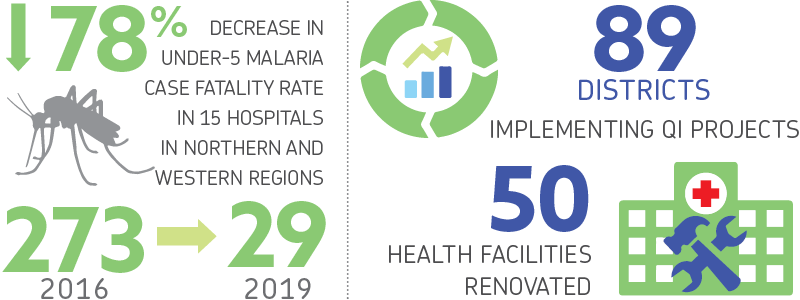Midwives and Nurses at Mayera Health Centre in Ghana observe closely as their colleague, a “Helping Babies Breathe” trainee, provides on-site coaching on neonatal resuscitation. Photo credit: Ross Godwin, DDC International
USAID Systems for Health Project
The Challenge
Ghana’s recent emergence as a lower-middle income country reflects tremendous progress in achieving steady economic growth and significant improvements in government effectiveness and institutional accountability. Despite these important advances, as of 2014 data, Ghana was not on track to achieve its 2015 Millennium Development Goals 4 and 5 targets.
However, Ghana has in place the health systems building blocks essential for scaling up and sustaining equitable access to lifesaving health interventions: a rapidly expanding health infrastructure (e.g., Community-Based Health Planning and Services [CHPS] strategy), health policies based on current international standards, a progressive national health insurance program, and a diverse and well-trained health workforce. Improved strategic coordination, management, and performance-based monitoring of the health system are now needed to systematically expand the demand for and access to quality health services.
Overview and Objectives
The Systems for Health Project (S4H) worked directly with the Ghana Health Service to address these challenges. The project enabled the Government of Ghana (GoG) and its health workforce, in direct partnership with the communities they serve, to sustain equitable access to, demand for, and use of high-quality, high-impact health services with reduced external support, especially in the five regions targeted by S4H.
URC worked with local Ghanaian partners and other partners to:
- Strengthen vital health systems building blocks – including an expansion of community-based health planning and services – and encouraging the integration of services to create a more robust, flexible, and sustainable health care system;
- Strengthen the Ministry of Health and Ghana Health Service to improve quality of care, increase readiness to access and manage U.S. government funds, strengthen referrals, and increase access to health care services; and
- Institutionalize improvement to ensure that quality services are provided to every client at every encounter, in conjunction with robust management support systems, enhanced technical competence, a culture of data use, and continuous monitoring.
Achievements

- Over 59,000 training contacts
- 16,000+ coaching visits with Ghana Health Service to health facilities
- 89 districts implementing quality improvement projects
- 50 health facilities renovated
- 26 new CHPS facilities constructed
- 80% of CHPS facilities offering four or more modern family planning methods (up from 47% in 2015)
- 78% decrease in under-5 malaria deaths in 15 hospitals in Northern and Western regions
- 20,500 health workers trained in infection prevention and control
- 42% decrease in maternal mortality ratio in 29 shared learning districts
- 35% reduction in institutional stillbirth rate in 25 learning districts
- 86% health directorates now have adequate capacity to manage U.S. government funds (up from 18% in 2015
- 51% increase in children fully immunized by age 1 in zones with newly-constructed CHPS facilities